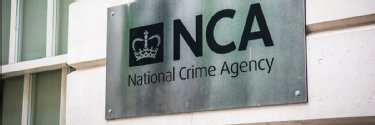News
-
 13 February 2026
13 February 2026
Direct-to-device connectivity set to underpin next generation of industrial IoT
-
 13 February 2026
13 February 2026
UK government calls for review into mobile market
-
 13 February 2026
13 February 2026
UK National Crime Agency seeks CDIO, offering more than £100k for the role
-
 13 February 2026
13 February 2026
Openreach appoints new chief executive
News Archive
-
February 13, 2026
13
Feb'26
Direct-to-device connectivity set to underpin next generation of industrial IoT
Research from satellite comms firm finds D2D connectivity will underpin the next generation of industrial internet of things, with almost all IoT decision-makers set to adopt the technology in the next 18 months
-
February 13, 2026
13
Feb'26
UK government calls for review into mobile market
UK government creates programme to anticipate how the mobile market, and technologies that underpin it, will evolve over the next decade
-
February 13, 2026
13
Feb'26
UK National Crime Agency seeks CDIO, offering more than £100k for the role
The chief digital and information officer will be expected to set the National Crime Agency’s digital, data and technology sourcing strategy, secure multi-year investment and manage a £100m budget
-
February 13, 2026
13
Feb'26
Openreach appoints new chief executive
UK’s leading broadband provider announces that its deputy CEO will succeed incumbent chief executive from 1 April 2026, and that the company looks to maintain pace of full-fibre deployment
-
February 13, 2026
13
Feb'26
Singapore to form National AI Council, expands tax breaks to ease AI adoption
Singapore government unveils plans to spur AI adoption through fiscal incentives, implementation guidance and workforce skilling in a concerted effort to drive the nation’s AI agenda
-
February 12, 2026
12
Feb'26
Government bank digital project a ‘full-spectrum disaster’ exposing taxpayers to risk
National Savings and Investments is unable to tell Public Accounts Committee the cost of its modernisation programme
-
February 12, 2026
12
Feb'26
Europe’s data protection supervisors warn over plans to ‘narrow’ privacy rights
European data protection supervisors warn the European Commission against narrowing the privacy protections for personal data as it gears up for a swathe of data protection reforms
-
February 12, 2026
12
Feb'26
Thousands of unread emails and 20 million database errors cause civil service pension hardship
Capita is to ‘fast-track’ any technology, including artificial intelligence, that can help it clear a backlog in civil service pension work
-
February 12, 2026
12
Feb'26
Large language models provide unreliable answers about public services, Open Data Institute finds
Research questions AI’s trustworthiness in giving people accurate information about government services
-
February 12, 2026
12
Feb'26
Power supply issues flagged as major growth inhibitor of European datacentre market
The latest report into trends across the European datacentre market shines a light on how power supply issues are affecting growth
-
February 12, 2026
12
Feb'26
European Commission: TikTok’s addictive design breaches EU law
In a preliminary ruling, European Commission says TikTok’s additive design features are in breach of laws designed to create safer digital spaces
-
February 12, 2026
12
Feb'26
e& drives AI-first workforce transformation with Oracle Cloud
UAE technology group deploys Oracle Fusion Cloud HCM on OCI Dedicated Region to embed artificial intelligence across human resources while meeting national data sovereignty requirements
-
February 12, 2026
12
Feb'26
UK fintech investment slumped in 2025
Investment in the UK fintech sector fell to its lowest level since 2020, but it is still the European destination attracting the most money
-
February 12, 2026
12
Feb'26
College of Policing accounts ‘disclaimed’ by auditor for second year in wake of IT failure
Government auditors have refused to endorse the financial accounts of the professional body for policing in England and Wales for a second year, following IT project blunders
-
February 11, 2026
11
Feb'26
CVE volumes may plausibly reach 100,000 this year
The number of vulnerabilities to be disclosed in 2026 is almost certain to exceed last year's total, and may be heading towards 100,000, according to analysis
-
February 11, 2026
11
Feb'26
London Assembly member: Police should halt facial-recognition technology use
In lieu of a full-blown ban on the technology, Green London Assembly member Zoë Garbett has called for a number of new safeguards to be implemented that she feels would protect Londoners from ‘escalating’ biometric surveillance
-
February 11, 2026
11
Feb'26
Peer ‘disappointed’ that DWP review of subpostmaster prosecutions is still months away
Government indicates that there are 108 DWP prosecutions of subpostmasters that will be reviewed so far, but little progress has been made
-
February 11, 2026
11
Feb'26
The Security Interviews: Mick Baccio, Splunk
Mick Baccio, global security advisor at Splunk SURGe and Cisco Foundation AI, reveals how the experience of running cyber on a dime for a US presidential campaign has informed how he does security, and why the basics still matter
-
February 11, 2026
11
Feb'26
APAC firms ditch Oracle Java to cut costs amid AI demands
Rising Oracle Java licensing fees and the massive infrastructure requirements of AI workloads are driving the region’s businesses to migrate to OpenJDK distributions
-
February 11, 2026
11
Feb'26
UK government datacentre planning decisions queried over environmental oversight admission
The UK government’s admission that it made a mistake granting permission for a hyperscale datacentre to be built in Iver, Buckinghamshire, has raised questions about the validity of similar approved projects
-
February 11, 2026
11
Feb'26
CIOs discuss friction between legacy IT and innovation
While it may not be something IT leaders want to talk about, managing technical debt is critical to moving forward with IT innovation
-
February 11, 2026
11
Feb'26
Lack of resources greatest hurdle for regulating AI, MPs told
Regulators warned that statutory powers alone cannot address the ethical harms of artificial intelligence
-
February 11, 2026
11
Feb'26
Fujitsu will be out by next summer, says Post Office CTO
Post Office’s project to replace its controversial core system will contract suppliers by the summer of this year, with the aim to remove Fujitsu by summer 2027, according to its chief technology officer
-
February 11, 2026
11
Feb'26
Cisco shapes up for delivery of critical infrastructure in the AI era
Annual European expo reveals what IT and networking behemoth claims will be a leap forward in AI adoption, with new products encompassing switches, optics, agentic operations and SASE
-
February 10, 2026
10
Feb'26
Arctic Wolf targets mid-market security gap in APAC
Following the launch of its full portfolio in Malaysia, the SOC provider discusses the security challenges facing lean IT teams, the value of supplier neutrality, and its roadmap for AI and ransomware protection
-
February 10, 2026
10
Feb'26
February Patch Tuesday: Microsoft drops six zero-days
Microsoft releases patches for six zero-day flaws in its latest monthly update, many of them related to security feature bypass issues
-
February 10, 2026
10
Feb'26
Researchers delve inside new SolarWinds RCE attack chain
Researchers at Huntress and Microsoft have shared findings from their analysis of a new SolarWinds Web Help Desk vulnerability
-
February 10, 2026
10
Feb'26
Apple and Google pledge to improve app fairness
The CMA is seeking views on Apple and Google’s commitments to ensure fair app store practices to stoke the UK’s app economy, fintech and improve developer confidence
-
February 10, 2026
10
Feb'26
Is the EU’s free trade deal with India the dawn of a new era?
Trade deal between European Union and India simplifies the visa system for professionals from India, which could make the country’s suppliers more accessible
-
February 10, 2026
10
Feb'26
Second ever international AI safety report published
More than 100 artificial intelligence experts have produced the second international AI safety report ahead of a summit in India, outlining a high degree of uncertainty about the development and risks of AI
-
February 10, 2026
10
Feb'26
G42 expands global AI ambitions with sovereign cloud partnership in Vietnam
UAE artificial intelligence champion takes its sovereignty-first model to Southeast Asia
-
February 10, 2026
10
Feb'26
HPE goes for gold with Winter Olympics network performance
Networking firm reveals role played by its legacy business and that of acquired companies as the official network equipment hardware partner for Milano Cortina 2026, connecting venues, athletes, media and operational systems
-
February 10, 2026
10
Feb'26
Artificial intelligence now finance sector’s ‘connective tissue’
Major study finds debate over AI adoption is over as almost every finance firm in the world is already using the technology
-
February 10, 2026
10
Feb'26
Singapore mounts largest ever cyber operation to oust APT actor
Operation Cyber Guardian mobilised over 100 defenders to neutralise UNC3886, which infiltrated Singtel, StarHub, M1 and Simba networks, operators issue joint pledge on defence-in-depth
-
February 09, 2026
09
Feb'26
Fractile expansion demonstrates UK growth opportunity
AI chip firm’s £100m expansion and facility in Bristol is being used to showcase the government’s AI opportunity plan in action
-
February 09, 2026
09
Feb'26
Russia’s cyber attacks on Polish utilities draws NCSC alert
A series of Russian cyber attacks targeting Poland’s energy infrastructure has prompted a warning from the UK’s National Cyber Security Centre
-
February 09, 2026
09
Feb'26
NTT Data deepens Middle East cloud push with acquisition of UAE-based Zero&One
Deal highlights growing strategic importance of the UAE as global technology firms race to scale cloud, AI and digital services across the region
-
February 09, 2026
09
Feb'26
UAE’s TII challenges big tech dominance with open source Falcon AI models
Through its Falcon models and an open, efficiency-driven research strategy, the Technology Innovation Institute is positioning the UAE as a producer of foundational AI, not merely a consumer of global platforms
-
February 09, 2026
09
Feb'26
Ireland to procure national electronic health record
The Irish government has approved project to digitally transform the Irish health service by introducing integrated health records as part of Digital for Care strategy
-
February 09, 2026
09
Feb'26
US bid for Dutch ID infrastructure raises sovereignty concerns
Kyndryl’s proposed takeover shows how critical systems become exposed to foreign control without an overarching policy decision
-
February 09, 2026
09
Feb'26
As space gets crowded, cyber threats from jamming to stalker satellites loom large
Experts at the inaugural CYSAT Asia in Singapore warn of the urgency of securing space assets amid growing geopolitical tensions and supply chain vulnerabilities
-
February 06, 2026
06
Feb'26
NHS publishes tech-laden cancer plan
The 10-year plan promises to transform cancer care through use of artificial intelligence, robotic surgeries and access to genomic testing, all wrapped up in the NHS App as the front door
-
February 06, 2026
06
Feb'26
Australia’s CommBank partners business school to research artificial intelligence
CommBank wants to better understand how its customers perceive, use and trust artificial intelligence, as the technology is set to reach every corner of the finance sector
-
February 06, 2026
06
Feb'26
Private LTE/5G networks reached 6,500 deployments in 2025
Analysis of private 5G market finds steadily growing market that is increasingly driven by organic demand from end users, with WAN and enterprise segments of near equal worth
-
February 06, 2026
06
Feb'26
AWS Q4 results: Public cloud giant continues to reap rewards of enterprise demand for AI and IaaS
Public cloud giant Amazon Web Services claims the final quarter of 2025 saw it achieve its fastest rate of growth in 13 quarters
-
February 06, 2026
06
Feb'26
Minister responds to criticism of Post Office Capture redress scheme
Redress claim on ‘pause’ as UK government agrees to look at complaints about scheme for those who suffered hardship from using the Post Office Capture system
-
February 06, 2026
06
Feb'26
Virgin Media O2 accelerates automation across mobile network
UK telco teams with cloud-first tech modernisation firm to deploy AI-driven automation technology to minimise downtime across mobile network, resolve issues faster and anticipating faults before escalation
-
February 06, 2026
06
Feb'26
ANZ rolls out AI agents for business bankers
Australian lender claims to be the first in Asia-Pacific to deploy Salesforce Agentforce at scale, following a national roll-out of a CRM platform that consolidates data from different systems to ease administrative toil
-
February 05, 2026
05
Feb'26
Why traditional automation is key to avoid the AI solution trap
Boards are pushing for AI, but Nintex CTO Niranjan Vijayaragavan warns that AI projects are destined to fail without a foundation of traditional automation and clean data
-
February 05, 2026
05
Feb'26
Hyundai Motor Group and Vodafone IoT deploy connected cars across MENA region
Internet of things division of leading European telco partners with Korean motor giant to power connected cars in five countries across the Middle East, claiming reliable and secure in-car connectivity that is fully compliant with regional laws


